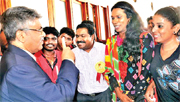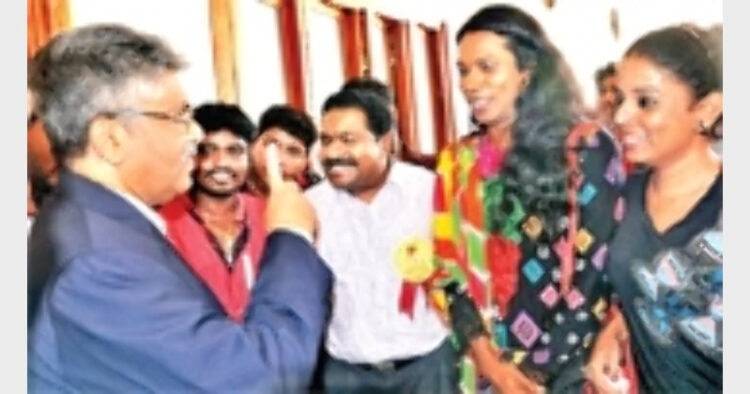 Speaking at a function organised by a progressive Muslim women’s forum, Kerala High Court Judge B Kemal Pasha said that the Muslim Personal Law in Bharat is discriminatory to women
Speaking at a function organised by a progressive Muslim women’s forum, Kerala High Court Judge B Kemal Pasha said that the Muslim Personal Law in Bharat is discriminatory to women
Justice Kemal Pasha’s question was straight and simple. It was socially relevant and politically significant. Most apt was the occasion. Nevertheless very few came out in the open in support of the bitter truth he pointed out. The honourable judge of the Kerala High Court was speaking at a function organised in connection with the International Women’s Day. Little wonder that he seized the occasion to question the grave discrimination to Muslim women. The theme of the women’s day this year – “Planet 50:50 by 2030.Step it up for gender equality” – added to the relevance of Pasha’s inaugural address at the progressive Muslim Women’s Forum in Kozhikode. But he received only brickbats, and that too in abundance. No bouquets so far.
It requires tremendous guts these days to call a spade as spade. For fear of being dubbed communal or at least anti-secular, those who do not wish to be unpopular, would prefer not even to call it as an agricultural tool. Most consider silence to be not only golden but also safe of late. But Justice Kemal Pasha is refreshingly different. His question was a bullet and it did hit the bull’s eye. Prompt and sharp was the reaction to what he said from Muslim outfits of all hues. They transcended their organisational and ideological differences in campaigning against Justice Pasha.
Speaking on the misuse of Muslim Personal Law and its discrimination to women, Justice Pasha questioned “Why women could not have husbands when men could have four wives?” He pointed out that polygamy was prevalent in secular Bharat even as it is banned in several Muslim countries. The Koran gives equal rights to both men and women. It is easy for Muslim men to divorce. On the contrary their women find it quite difficult to seek divorce as per the personal law. The Muslim Personal Law has adopted various tenets from Koran. When it comes to women, the personal law refuses to adhere to Koran. The judge blamed religious leaders for being discriminatory and not at all judicious. Referring to divorce by pronouncing triple ‘talaq’, he argued that both men and women who were human beings with dignity, should be given enough time to come to a conclusion or decision. Marriage is an implied contract to provide the married woman safety and security. Oral triple ‘talaq’, he said, has no sanction of Islamic jurisprudence. Our constitution, under Article 14 and 21, gives protection to all, he pointed out. Protection of women from domestic violence would be fruitful only if the right of a woman to her husband’s property is properly defined. Justice Pasha, therefore, called for an honest introspection by the religious leaders. He urged Muslim women to come forward to end the injustice.
Justice Pasha’s words of wisdom bring back to memory the widely debated Shah Bano case of the mid eighties. Shah Bano, an elderly Muslim woman, mother of five children, was divorced by her husband. Her husband refused to pay her maintenance beyond the three month period of ‘iddat’. The case went up to Supreme Court and finally the court granted maintenance for life under Section 125 of CrPC. As per the historic verdict, Shah Bano was eligible for maintenance until her death if she had not remarried. The Supreme Court had ruled that CrPC was common to all citizens and that the Muslim Personal Law could not be applied. But as expected, true to the minoritism vigorously pursued and practised by the Indian National Congress, the then Rajiv Gandhi government was quick to get the Muslim Women (Protection of Rights & Divorce) Act 1986 passed, which nullified the Supreme Court judgement.
But then there was a nation-wide debate on the whole case, the court verdict and its nullification. Opposition to ‘Sharia’ came also from most unexpected quarters. The Left too was in the forefront in the campaign against discrimination to Muslim women. CPM MP Saifuddin Choudhury made a fiery speech in the parliament defending Shah Bano. EMS Namboodiripad, the then CPM general secretary even made it an election issue. Namboodiripad’s move was in fact a somersault. It was he himself, as Kerala Chief Minister during 1967-69, formed the Muslim majority district of Malappuram and gifted it to his coalition partner the Indian Union Muslim League, the Muslim majority district of Malappuram. The U-turn by the CPM supremo was only because he felt that opposing ‘Sharia’ then would help play the Hindu card and thereby bring political dividends. Comrades, after all, have no qualms in playing the Hindu card or the Muslim card to suit their political ends. To them, it does not matter whether the cat is black or white if it catches mice. Significantly, Namboodiripad had then too with him a faction of Muslim League a partner of the Left Democratic Front. That was the All India Muslim League, a break-away group from Indian Union Muslim League which then was with Congress- led United Democratic Front. But AIML left LDF in protest against the CPM stance in Shah Bano case. Protest marches were taken out all over by Muslim League factions, which later remerged, shouting slogans “Naalum kettum, ettum kettum, EMSinte olem kettum” meaning we will marry four women or even eight and would not mind marrying EMS’ dearest.
The situation has not changed even after thirty years since the Shah Bano case. Discrimination against Muslim women continues unabated. Justice Kemal Pasha was only reviving the debate and rightly so. History only repeats when several bodies of Muslim women now take up cudgels against the discriminatory personal law. The issue is once again before the Supreme Court. The moot question now is whether general discrimination suffered by Muslim women should not be considered violation of fundamental rights guaranteed by constitution under Articles 14, 15 and 21 as well as by international covenants. Already the Bharatiya Muslim Mahila Andolan, with over seventy thousand members drawn from among thirteen states in the country, has suggested that Muslim women could be granted justice only through amendments to Shariat Application Act, 1937 and dissolution of Muslim Marriages Act, 1939. The body called for codification of personal law adhering to Koran in all respects. NISA, a forum which champions the cause of Muslim women has already approached the apex court demanding amendments to Muslim Personal Law.
Kemal Pasha is under scathing attack by Muslim outfits and leaders. They are adamant that there could be no compromise on Sharia, come what may. “It is the law of God and shall not be changed”, they assert in one voice. They allege that the judge is playing into the hands of ‘Sangh Parivar’ by coming out in support of a uniform civil code. Ridiculous is the counter question posed against Justice Pasha’s vital question. It too is simple and straight – “If women are allowed to have four husbands as four wives are allowed to men, how can we decide the paternity of a child born of such a woman?”. While Kemal Pasha is being attacked, he is yet to get anyone to defend him in public. Feminists and pseudo secular women organisations which turned vociferous on the question of allowing women in the hill shrine of Sabarimala are conspicuously silent. The media which was ‘celebrating’ Sabarimala issue, chose to be simply silent on the Muslim women’s issue. No political party or leader has dared to support the judge either. The reasons are not far to seek, especially with elections round the corner.
Hari S Kartha (The writer is Senior Executive
Editor, Amrita TV)













Comments